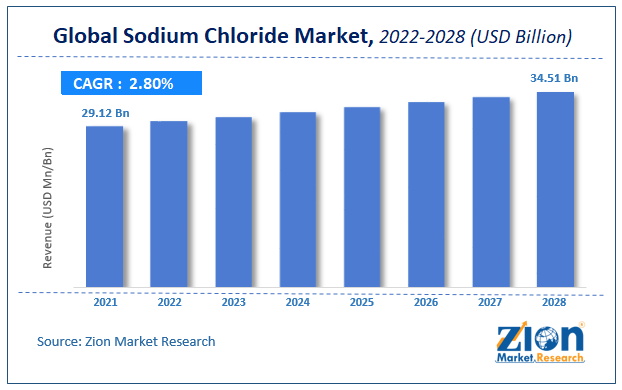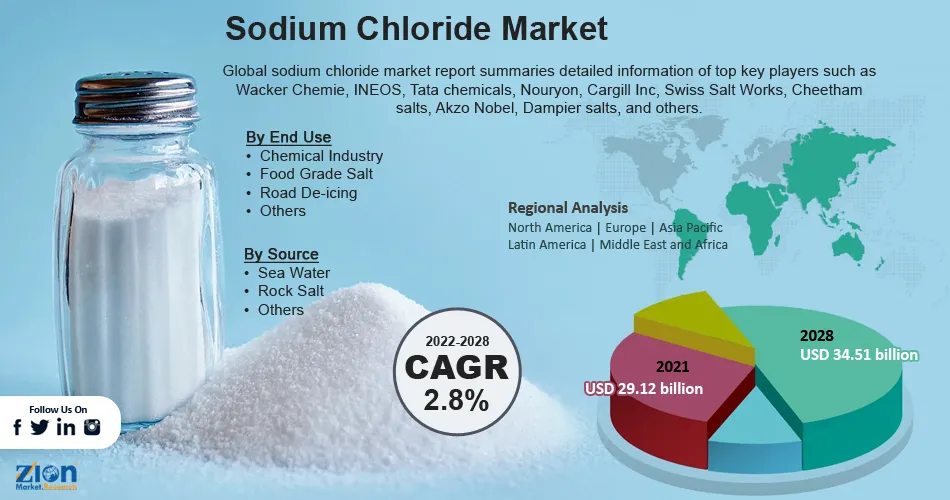Sodium Chloride Market Size, Share, Growth, Trends, and Forecast, 2030

Sodium Chloride Market - By Grade (Agriculture, Food, Industrial, Pharmaceuticals), By Source (Sea Water, Rock Salt, and Others), By End-Use (Chemical Industry, Food Grade Salt, Road De-icing, and Others), and By Region - Global and Regional Industry Overview, Market Intelligence, Comprehensive Analysis, Historical Data, and Forecasts 2022-2030
The global sodium chloride market size was around USD 29.12 billion in 2021 and is predicted to reach USD 34.51 billion by 2028, growing at 2.8%.
Industry Prospective:
The global sodium chloride market reached nearly USD 29.12 billion in 2021 and is expected to grow to around USD 34.51 billion by 2028, with a compound annual growth rate (CAGR) of roughly 2.8 percent. The study examines the drivers, constraints, and challenges in the sodium chloride market, as well as their impact on demand during the forecast period. The research also looks into new sodium chloride market potential.
Sodium Chloride Market: Overview
Sodium Chloride is an ionic compound with the chemical formula NaCl, it is made up of chloride and sodium ions in a 1:1 ratio. Sodium chloride, sometimes known as salt, table salt, or common salt, is easily soluble in water. It has the appearance of a white crystalline solid and has emetic & flame retardant properties. In human body, it is necessary for keeping the electrolyte balance of a person's body fluids. Furthermore, NaCl is required by the body to absorb & transport nutrients, regulate blood pressure & fluid balance, convey nerve impulses, and contract & relax muscles. NaCl has seen a major increase in use in recent years in a variety of industries, including animal feed, waste & water treatment, textiles, and medicines.
Sodium chloride is an ionic compound which is the major reason for the salinity of seawater. It is generally known as the salt. Mining of salt halites and the evaporation from sea water are the two major methods for the production of common salt. It occurs in the crystal forms used in the different consumer applications as well as industrial purpose. By the evaporation method from the seawater, sodium chloride is obtained. The element is having the same ratio 1:1 of sodium and chloride. Sodium chloride in large quantities is majorly used in many industrial processes. Moreover, it is also used for deicing of roadways especially in sub-freezing weather and also for chemical synthesis, water softening, stabilizing soils, etc. Salt is directly or indirectly used in the production of many chemicals.
Rising number of chemical industries is boosting the demand for chlor-alkali products which includes soda ash, caustic soda, chlorine, and others. These products are further used for producing the products such as soaps, detergents, dyes, PVC, among others. Moreover, increasing demand for the sodium chloride from various industries such as food and beverages, deicing, chemicals, and others are fueling the market growth. In addition to this, growing demand in the pharmaceutical industry is also stimulating the market growth during the forecast period. However, storage difficulties of the sodium chloride and low-profit margins are hampering the market growth during the forecast period. Nonetheless, extensive use of salts in the deicing industries is expected to be an opportunity for the major players in the market.
COVID-19 Impact:
The coronavirus (COVID-19) pandemic has forced governments in a number of nations to implement statewide lockdowns and social distancing measures with the chemical sector seeing manufacturing facility closures. During the 2020-2021 period, these variables had negative influence on the sodium chloride market. However, not all areas have been affected equally, since sales of pharmaceutical grade sodium chloride have grown throughout this time due to an increase in demand from the healthcare industry. According to the findings, the market in other end-use sectors is on track to rebound quickly in the coming fiscal year.
Sodium Chloride Market: Growth Drivers
Expansion of chemical and pharmaceutical industries in emerging countries may propel the market growth.
Emerging countries such as China, India, South Korea, Brazil, South Africa, and Mexico are expanding their business strategies to strengthen their economies. These countries are investing heavily in developed chemical and pharmaceutical industries to reduce dependency on developed countries. One of the primary reasons driving the market's growth is the rising demand for sodium chloride as a raw ingredient for personal care products and an intermediary in the manufacture of chemicals. Additionally, as more people become aware of the compound's potential as a flavor enhancer, demand for it is expected to rise in the food sector. As a result, the global sodium chloride market is likely to be driven by increased demand for the compound in end-use applications throughout the forecast period.
Sodium Chloride Market : Report Scope
| Report Attributes | Report Details |
|---|---|
| Report Name | Sodium Chloride Market Research Report |
| Market Size in 2021 | USD 29.12 billion |
| Market Forecast in 2028 | USD 34.51 billion |
| Growth Rate | CAGR of 2.8%. |
| Number of Pages | 150 |
| Key Companies Covered | Wacker Chemie, INEOS, Tata chemicals, Nouryon, Cargill Inc, Swiss Salt Works, Cheetham salts, Akzo Nobel, Dampier salts, and others. |
| Segments Covered | By Source, By End Use, and By Region |
| Regions Covered | North America, Europe, Asia Pacific (APAC), Latin America, Middle East, and Africa (MEA) |
| Base Year | 2021 |
| Historical Year | 2021 to 2028 |
| Forecast Year | 2022 - 2028 |
| Customization Scope | Avail customized purchase options to meet your exact research needs. Request For Customization |
Sodium Chloride Market: Restraints
Health concerns related to use of sodium chloride may hamper the market growth
Consumer knowledge of the adverse health consequences of sodium chloride, as well as its influence on plants and animals, has increased in recent years. When the substance is used to de-ice roadways, it typically results in the absorption of high-sodium salts in the form of water runoff (melting snow) by animals. Sodium in drinking water is also a health risk for people who are on a low-sodium diet owing to high blood pressure. As a result, the US Environmental Protection Agency mandates that salt levels in drinking water be monitored, with public water providers obliged to report any concentrations over 20 mg sodium per liter of water (20 mg/L) to local health authorities.
Sodium Chloride Market: Opportunities
Increasing use of sodium chloride in pharmaceutical sector is expected to propel market growth.
In terms of volume, the pharmaceutical industry makes up less than 5 percent of the total market. However, with comparatively greater profit margins, it is one of the fastest expanding categories in the sodium chloride industry. In recent years, the sector has experienced significant developments, and oral medicine administration has produced greater outcomes, making the use of sodium chloride for flavoring essential. Further, matrix tablets are useful for controlled and sustained release doses, and pharmaceutical-grade sodium chloride is increasingly being utilized to make them. All these factors are supporting the strong demand for sodium chloride in the pharmaceutical sector, thereby boosting the global sodium chloride market growth.
Sodium Chloride Market: Challenges.
High cost of storage industry-grade sodium chloride poses major challenge for the market growth.
The quality of industry grade sodium chloride can reduce if not stored properly which is it is recommended that it should be maintained in a tightly closed container and kept in a cold, dry, well-ventilated environment. Also, it is important that this chemical isn't exposed to too much heat.
Recent Developments
- In March 2021, Nouryon decided to sell its Salt Specialties business, which includes names including KNZ, Sanal, Suprasel, NEZO, JOZO to the Salins Group, a French-based multinational salt business.
- In September 2021, Mitsui & Co., Ltd. introduced "THE SHARKBAY SALT," a table salt that Mitsui developed and is produced in collaboration with Ako Kasei. "THE SHARKBAY SALT" incorporates solar marine salt made by Mitsui's 100% subsidiary, Shark Bay Salt Pty Ltd, which is ecologically sustainable.
Sodium Chloride Market: Segmentation
The global sodium chloride market is categorized into Grade, Source, End-Use, and Region. All the segments of sodium chloride market have been analyzed based on present and future trends and the market is estimated from 2024 to 2030.
Based on grade, segment of the market is divided into Agriculture, Food, Industrial, Pharmaceuticals and others.
Based on source, the market is bifurcated into rock salt, sea water, and others.
The end-use segment of the market is divided into food-grade salt, chemical industry, road de-icing, and others.
Sodium Chloride Market: Regional Landscape
Asia Pacific to dominate the global market over the forecast period.
Asia Pacific is expected to hold the largest share in the global sodium chloride market. This is mainly due to the significant use of sodium chloride for chemical synthesis from the region's huge chemical and pharmaceutical industry base. Moreover, the market's expansion is likely to be aided by the rapidly expanding food industry. On the other side, increasing need for deicing applications, North America is likely to be the fastest expanding market. Due to rising industrialization and the associated increase in demand for feedstock chemicals, Europe is likely to develop significantly.
Sodium Chloride Market: Competitive Landscape
The global sodium chloride market report summaries detailed information of top key players such as
- Wacker Chemie
- INEOS
- Tata chemicals
- Nouryon
- Cargill Inc
- Swiss Salt Works
- Cheetham salts
- Akzo Nobel
- Dampier salts
- and others
Global sodium chloride market is segmented as follows:
By Grade
- Agriculture
- Food
- Industrial
- Pharmaceuticals
By Source
- Sea Water
- Rock Salt
- Others
By End Use
- Chemical Industry
- Food Grade Salt
- Road De-icing
- Others
By Region
- North America
- The U.S.
- Canada
- Europe
- France
- The UK
- Spain
- Germany
- Italy
- Rest of Europe
- Asia Pacific
- China
- Japan
- India
- South Korea
- Southeast Asia
- Rest of Asia Pacific
- Latin America
- Brazil
- Mexico
- Rest of Latin America
- Middle East & Africa
- GCC
- South Africa
- Rest of Middle East & Africa
Table Of Content
Methodology
FrequentlyAsked Questions
Expansion of chemical and pharmaceutical industries in emerging countries may propel the market growth. Additionally, as more people become aware of the compound's potential as a flavor enhancer, demand for it is expected to rise in the food sector. As a result, the sodium chloride market is likely to be driven by increased demand for the compound in end-use applications throughout the forecast period.
According to the Zion Market Research report, the global sodium chloride market was worth about 29.12 (USD billion) in 2021 and is predicted to grow to around 34.51 (USD billion) by 2028, with a compound annual growth rate (CAGR) of around 2.8 percent.
Asia Pacific is expected to hold largest share in the global sodium chloride market. This is mainly due to significant use of sodium chloride for chemical synthesis from the region's huge chemical and pharmaceutical industry base. Moreover, the market's expansion is likely to be aided by the rapidly expanding food industry.
The global sodium chloride market report summaries detailed information by top key players such as Wacker Chemie, INEOS, Tata chemicals, Nouryon, Cargill Inc, Swiss Salt Works, Cheetham salts, Akzo Nobel, Dampier salts, and others.
Choose License Type
RelatedNews
HappyClients
Zion Market Research
Tel: +1 (302) 444-0166
USA/Canada Toll Free No.+1 (855) 465-4651
3rd Floor,
Mrunal Paradise, Opp Maharaja Hotel,
Pimple Gurav, Pune 411061,
Maharashtra, India
Phone No +91 7768 006 007, +91 7768 006 008
US OFFICE NO +1 (302) 444-0166
US/CAN TOLL FREE +1 (855) 465-4651
Email: sales@zionmarketresearch.com
We have secured system to process your transaction.
Our support available to help you 24 hours a day, five days a week.
Monday - Friday: 9AM - 6PM
Saturday - Sunday: Closed







